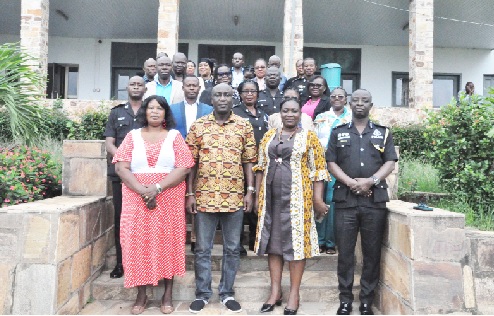
Stop settling rape, defilement cases at home — Chief Director
THE Chief Director of the Volta Regional Coordinating Council (VRCC), Augustus Awity, has expressed worry over the practice of prominent persons in some communities in the area settling rape and defilement cases without handing over the perpetrators to the police.
He said the trend was encouraging crime, adding that rape and defilement cases were serious felonies which could not be settled at home.
The Chief Director, therefore, urged the police to maintain a firm stance to deal ruthlessly with those who covertly settled such cases at home.
Mr Awity was speaking at a day’s dialogue between the Department of Gender and 30 police officers, including personnel of the Domestic Violence and Victim Support Unit (DOVVSU), in Ho.
The programme was supported by ActionAid, an NGO, with funding from the European Union (EU).
It was aimed at building the capacity of DOVVSU officers to recognise the signs of violence, document and respond to such cases and support survivors to get justice.
The forum was also to help improve gender equality and achieve a reduction of domestic violence against women and girls in communities.
Mr Awity said those who settled cases of violence against women and girls at home were condoning the offence and perverting the course of justice.
He said it was more disheartening to realise that among those who usually presided over such settlements were chiefs, pastors, assemblymen and politicians.
Worse of all, other prominent people settled such cases for monetary gains, Mr Awity claimed.
Mr Awity said Ghana was not a lawless country, and for that matter, serious crimes could not be settled at home and allow the perpetrators to walk free and commit the offence again.
Violence against women
The Volta Regional Director of Gender, Thywill Eyra Kpe, said Ghana still had a high prevalence of violence against women and girls and embedded social and cultural norms which normalised the practice.
To reverse the trend, she said, ActionAid Ghana, with funding from the EU Commission was working in collaboration with the International Federation of Women Lawyers Ghana (FIDA-Ghana), to implement “The Transformative Action for Gender Equality” project to empower women and girls to understand and recognise all forms of domestic violence.
Mrs Kpe said it would also enable them to seek protection and defend themselves, both within their communities and through the effective implementation of relevant laws, policies and legal mechanisms.
PWDs barriers
The Volta Regional President of Persons with Disabilities (PWDs), Elikplim Klu, said people with disabilities faced significant barriers in accessing DOVVSU services.
She cited physical barriers such as the inability to have easy access to buildings, limited or no sign language interpreters, and stigma from members of the public, including some officers as some of the obstacles.
The Deputy Volta Regional Police Commander, ACP Joseph Owusu-Ansah, urged members of the public to report cases of domestic violence against women, girls and children promptly to the police for quick action.
